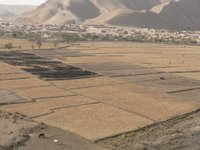 We had a wonderful trip to North: we got hot weather at Kunduz, mist at Pul-i Khumri, chilly rain at Mazar-e Sharif and snow on Salang Pass.
We had a wonderful trip to North: we got hot weather at Kunduz, mist at Pul-i Khumri, chilly rain at Mazar-e Sharif and snow on Salang Pass.First we drove to Kunduz, which is known for its fertility. Although watershed of Amudarja (Oxus) River covers only 14% of the territory of Afghanistan, it gives 57% of water. Afghans can afford two crops a year at lower parts of this area. There was a proverb: “If you want to become a rich, come to Kunduz.”
Thsingish-Khan devastated Kunduz at 1220. And the area never recovered. There was a little bit of better times in the 19th century, but then another trouble emerged: malaria. The new proverb was :”If you want to die, come to Kunduz.”

The pushtus were resettled here by King Abdur Rahman in the 1930ties. The value of land was really almost nothing: people came from the South of Hindukush and refugees of Russian Revolution came from North.
I respect farmers of Kunduz: they are hard-workers. When I was there in May, it was already the time to harvest wheat. Now it is the time of autumn ploughing. Other popular crops seem to be
 maize, rice and cotton. Roads are swamped by camels, donkeys and men, dragging colossal bags stuffed with snow-white cotton tufts.
maize, rice and cotton. Roads are swamped by camels, donkeys and men, dragging colossal bags stuffed with snow-white cotton tufts.I drove to a little village Aqtepa with Jelle, the leader of Kunduz River Base project. First we race along the straight highway to North. At certain moment we turn to half desert and start to drive across dunes. There is nothing at the horizon but sand and clumps of thorny plants.
Aqtepa oasis is situated at the crossing of Taloqan and Kunduz
 Rivers. There are big old trees, plenty of canals and mudbrick walls and houses. Jelle says that during the last one and a half year the situation has improved; he can hardly recognize the village. There are lots of people in the narrow street and a row of tiny shops. There is even a mobile mast at the edge of the village.
Rivers. There are big old trees, plenty of canals and mudbrick walls and houses. Jelle says that during the last one and a half year the situation has improved; he can hardly recognize the village. There are lots of people in the narrow street and a row of tiny shops. There is even a mobile mast at the edge of the village.Today an important event takes place: the water master – who is responsible for distribution of water in canals - is elected. Jelle explains that first the drinking water needs must be covered, agriculture is the next priority and only after that come other needs like energy etc.
 First we reach the place where the council of farmers is gathered. It is lunch time and delicious fish from Amudarja is being served. After eating the discussion follows. Jelle is informed that former water master has been elected back: there is no competition this year. Another issue: the locals are asking for a new dam with gates to regulate the amount of water in canal.
First we reach the place where the council of farmers is gathered. It is lunch time and delicious fish from Amudarja is being served. After eating the discussion follows. Jelle is informed that former water master has been elected back: there is no competition this year. Another issue: the locals are asking for a new dam with gates to regulate the amount of water in canal.
We drive to see the place. The canal is situated on the edge of the oasis: there is magnificent view to crossing of the rivers and another view to expansible marsh. Even frogs are croaking. Jelle is promising support to the construction of building before the new vegetative season. He states his terms as well: the villagers have to monitor the condition of the dam and gather some money for repairing of the foundation.
Tadjik Turamurod, the head of the construction company, discover my Russian language competence on the way back to Kunduz,. He invites us to his office. Very soon me and Jelle, we are sitting behind the table, carrying a remarkable amount of food. Bottle of Tadijk wine can be found as well. I try to be a translator (Jelle doesn’t know Russian and Turamurod doesn’t know English), but soon I am totally confused because of crafty Tadjik wine.
No comments:
Post a Comment